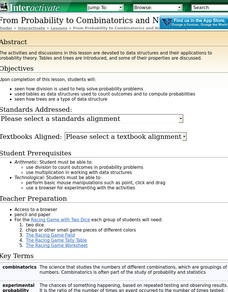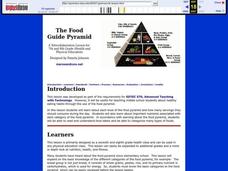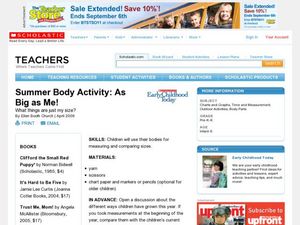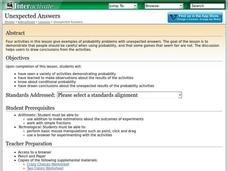Curated OER
A Mass of Pennies
Learners estimate and determine the number of cents (pennies) that are needed to equal the mass of a variety of common objects. They develop a process for measuring and explore concepts related to units of measurement.
Shodor Education Foundation
From Probability to Combinatorics and Number Theory
What middle schooler does not enjoy an occasional online game? In this lesson plan play, you will find embedded links to an online probability game, and informative pages about how division is used in probability, the concept of tree...
Curated OER
WATER HERE AND THERE
Introduce the topic of water conservation with a little drama. Dressed as snowflakes, hail stones, or rain drops class members dramatize the events in a narration of the water cycle. The series of lessons that follow focus on...
Curated OER
The Bean Growth Experiment
Fifth graders use modern technologies which allow them to gain a new, dynamic, and intersting understanding of themselves, their community, and the world. They focus on environmental education and the effect of the environment on plant...
Curated OER
The Food Guide Pyramid
Students examine each level of the food pyramid and how many servings they should consume during the day. They study the important nutrients associated with each category of the food pyramid.
Curated OER
How Fast is it Traveling?
Young scholars calculate the rate of speed of various moving objects within the classroom setting, or outside under a controlled environment.
Curated OER
Solid Waste
Learners determine the percentage increase in output of solid waste in the U.S. They determine the length of time it takes for throw away items to decompose.
Curated OER
Cartography Project
A lesson involving mapping, the use of a compass, writing and following directions, and exploring the first two themes of geography is here for you. Learners create original maps that show the routes they take through their own...
Curated OER
The Appliance Explosion
Students explain why the number of appliances used today differs greatly from the number used previously. They construct a bar graph to show changes in appliance use over a period of time. They also list appliances that could be eliminated.
Curated OER
Stack It Up!
Students analyze and begin to design a pyramid. Working in engineering teams, they perform calculations to determine the area of the pyramid base, stone block volumes, and the number of blocks required for their pyramid base. They make a...
Curated OER
Box It Up
Young scholars use a six-step problem solving method to design a box/container. They are given the criteria for evaluation when presented with the problem. Students keep a notebook on processes, procedures, material, cost, design,...
Curated OER
Y-Intercept and Slope Intercept Form
Alegebra amateurs identify the slope and the y-intercept given a linear equation in slope-intercept form by correctly completing some in class problems. They write the linear equation in slope-intercept form that corresponds to the given...
NTTI
Vectors: Traveling, But in What Direction
High schoolers watch a video of real-world situations regarding speed, direction, velocity, force, etc. and answer questions while viewing. They then practice drawing and using vectors to solve more real-world problems.
Curated OER
Summer Body Activity: As Big as Me!
Students explore things that are their size, literally. In this early childhood lesson plan, students use their bodies for measuring and comparing sizes as they work in pairs to complete the activity.
Curated OER
Red Circle, Red Circle, What Do You See?
Young learners explore shapes and colors. They listen to Brown Bear, Brown Bear What Do You See? by Bill Martin Jr. and use the same language pattern to create a color and shape book of their own. After that, with the leftover magazine...
Curated OER
Reading Graphs
Working independently or in teams, your class practices connecting graphs, formulas and words. This lesson includes a guided discussion about distance vs. time graphs and looking at how velocity changes over time.
Curated OER
Unexpected Answers
Students explore the concept of fairness. In this fairness activity, students play four probability games. Students determine who has the best chance of winning each of the four games. Students discuss which games gave an unfair advantage.
Curated OER
Build a Bar Graph
Learners discover how to use bar graphs. They will gather and organize specific data in order to put it into a bar graph. Then they will answer several questions based on the information they have graphed.
Curated OER
Supplementary, Complementary, and Vertical Angles
By using circles that they cut out and label themselves, learners literally "get a grip" on the angles they identify: supplementary, complementary, and vertical. They solve missing measurements based on properties of supplementary,...
Curated OER
Multiplying Polynomials
Students investigate polynomials. In this algebra lesson, students solve problems dealing with multiplication of polynomials by using the distributive property and the FOIL method. Students also describe how the...
Curated OER
Introduction to Exponents
Problem solve using exponents. Pupils read One Grain of Rice: A Mathematical Folktale and write powers to represent amounts from the story.They compare actual solutions to their predictions and play a game to practice using...
Curated OER
Comparing Fractions with Objects and Pictures
Scholars will compare fractions using objects and pictures. They view pre-made pictures and concrete objects of fractions. Then use small white boards to draw pictorial representations of fractions.
Curated OER
Matrix Analysis of Networks
Explore the connection between a finite graph, a directed graph, and a matrix. Graph lines and identify the relationship of matrices in real-world scenarios. Then use this information to work with a partner to plan and design a...
Curated OER
Mathematics Lesson for Grade 10
There are four main topics in this bundle of lesson plans. They don't need to be taught sequentially. Each lesson has three parts: a starter, a main activity, and something to help consolidate and provide reflection on concepts learned.

























